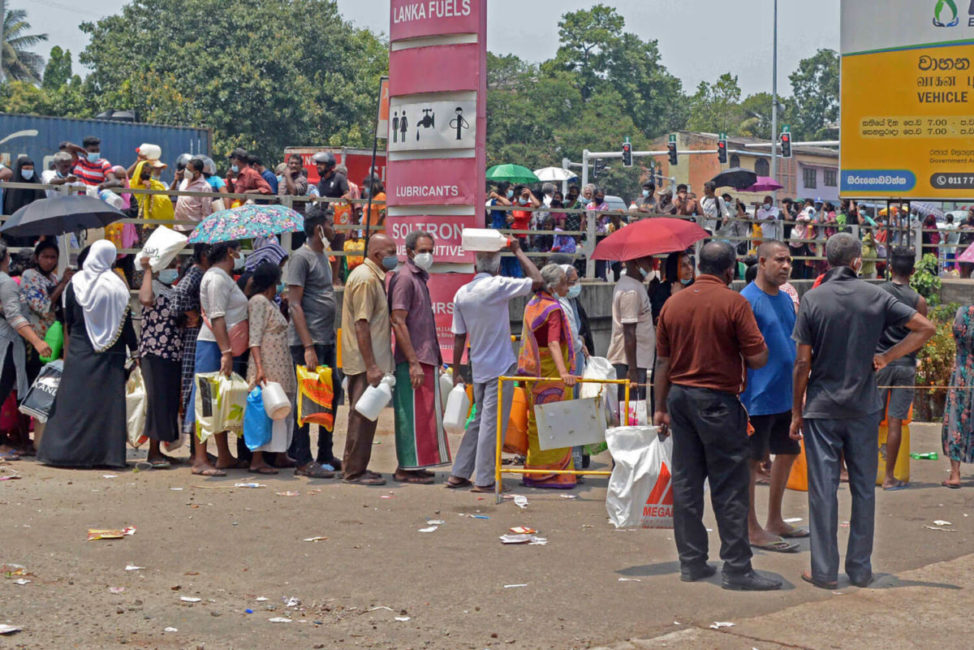How Fuel, Food Scarcity Plunged Sri Lanka Into Crisis – Red Cross
…Lawyer Advises Nigerian Politicians Not To Ignore Sri Lanka Revolt
The Sri Lanka Red Cross Society, National Headquarters, Dharmapala Mawatha, Colombo has tied the ongoing crisis in the nation to the resultant effect of fuel, food, and medicine scarcity.
Advertisement
THE WHISTLER reported that angry Sri Lanka protesters set the private residence of Prime Minister Ranil Wickremesinghe on fire.
They overpowered security guards and took over the presidential palace, insisting that the PM and President Gotabaya Rajapaksa must resign for their failure to address the nation’s economic crisis.
The president accepted to go and it was later announced by the nation’s parliament.
As published on its official website, the Red Cross explained that it was aware that an unprecedented economic crisis was unfolding in Sri Lanka.
Advertisement
It stated, “Fuel, food, and medicine – mostly imported – are scarce, and rising prices are putting what remains out of reach for many Sri Lankans. Power generation-long dependent on fuel and hydropower plants has been put out of service due to the current dry season and the lack of imported fuel.
“Power interruptions are now routine. The price of cooking gas, for example, is almost three times higher than it was just five months ago. Long queues for essential items are now a common sight over the island. Difficulties in supplying fuel for generators and shortages in essential medicine have stalled surgical operations and ICU treatments of patients in some hospitals. And the rising cost of medicines is adding to a medical emergency of high proportions.”
The humanitarian movement stated that following the humanitarian catastrophe where citizens are becoming helpless, it intends to intervene to mitigate suffering.
“Therefore, the Sri Lanka Red Cross Society being the leading humanitarian service provider, expect to provide essential consumer goods to the most vulnerable communities and deliver essential medicines to hospitals,” the website stated.
Speaking on the development, human rights lawyer and Executive Director, Citizens Advocacy for Social & Economic Rights, Frank Tietie, said in a statement that the present situation in Sri Lanka can happen in Nigeria if urgent steps are not taken by the government to reverse the country’s increasing dependency on the importation of food.
Advertisement
His statement made available to THE WHISTLER partly reads:
“Pictures and videos of angry Sri Lankans in their thousands taking over the presidential palace in Colombo show how much rage can be generated by a widespread lack of food. And as one commentator noted that even Sri Lankans who were once divided by religion and political ideologies, were all united by hunger to chase away the president, Gotabaya Rajapaksa and his entire government.
“This should therefore remind Nigerian politicians and bureaucrats that the widening ethnoreligious divides among Nigerians may not prevent a popular revolt against the government if such a revolt is driven by hunger.
“With signs that some state governments will no longer be able to afford the payment of salaries in the coming months, urgent questions should now be raised about Nigeria’s national food security preparedness. The statistics of Nigeria’s strategic food reserves must be examined to know how much Nigeria can cope in the face of global disruptions to food imports.
“The wave of politics in the current election cycle in Nigeria shouldn’t shy away from debates on national food security. Importantly, the presidential aspirants of the various political parties must be put to task on providing a realistic roadmap to ensure food sufficiency in Nigeria.”



